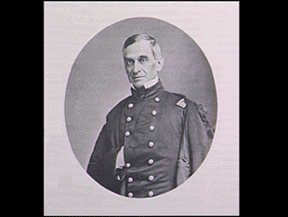![]()

A southerner by birth, Robert Anderson was born near Louisville, Kentucky, in 1805. His brother, Richard, was a lawyer, politician, and diplomat, and Anderson, after graduating from West Point in 1825, briefly served as his brother's private secretary when he was minister to Colombia. He then pursued a career in the military, serving in the Black Hawk and Florida wars, and later as a captain under General Winfield Scott in the Mexican War. An expert in artillery, Anderson was honored for his bravery in the field.
During the secession crisis, Anderson, now a major, was chosen to command the federal forts in Charleston Harbor. The appointment owed much to his southern ties. Southern born, married to a Georgian, he was a defender of slavery. He seemed to the Buchanan administration likely to be cautious and tactful in his duties, thereby avoiding actions provocative to South Carolina.
Southerners thought Anderson would be sympathetic to their demands that the forts be turned over to the South. Indeed, Anderson himself seemed to think that if war could be avoided, the seceding states might, ultimately, return peaceably to the Union. He wished to avoid an outbreak of fighting and, as his situation at Sumter deteriorated, he considered evacuation both necessary on military grounds and desirable in terms of avoiding provocation. These sentiments raised some doubt in Lincoln's mind about his loyalty. However, Anderson held firmly to the Union and to his responsibilities as an officer.
On arriving in Charleston, Anderson situated himself at Fort Moultrie, and urgently called for reinforcements from the War Department. Although President Buchanan initially agreed, he reversed himself under pressure from southern members of his cabinet, and Anderson was ordered to take no action that would tend to provoke aggression. However, he was instructed to hold the forts and defend himself if attacked. Anderson considered his move from Moultrie to Sumter on December 26, 1860 consistent with these instructions. By placing his command in the most defensible position, he hoped to avoid bloodshed.
After the fall of Fort Sumter, Anderson evacuated his garrison to New York, where he was treated as a hero. Promoted to brigadier general, he returned to active duty as commander of Union forces in Kentucky. But failing health, perhaps hastened by the mental and physical demands of his Sumter service, forced him to retire from active duty. He retired to New York City, briefly emerging from private life to attend the flag-raising ceremonies at Sumter in April 1865. After the war, he and his wife left for Europe, hoping to improve his condition, but in 1871, he died in Nice, France. He was buried at West Point.